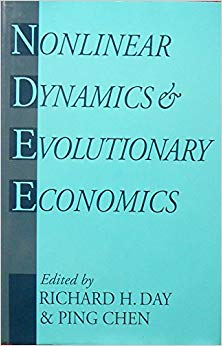- Photos
- Works
Other photo of Ping Chen
30 Xueyuan Rd, Haidian Qu, Beijing Shi, China
Ping Chen studied at the University of Science and Technology in Beijing, China, where he earned a Bachelor of Science in 1968.
Other photo of Ping Chen
Austin, TX 78712, USA
Ping Chen received his Ph.D. in Physics at the University of Texas at Austin in 1987, supervised by Ilya Prigogine.
Other photo of Ping Chen
Ping Chen is a Member of the American Economic Association since 1992.
-
![]()
-
![]()
-
![]()
-
![]()
-
data-src="/web/show-photo.jpg?id=2600722&cache=false" src="" alt="" class="gallery-slider__content__img" height=""
-
data-src="/web/show-photo.jpg?id=2600791&cache=false" src="" alt="" class="gallery-slider__content__img" height=""
-
data-src="/web/show-photo.jpg?id=2601015&cache=false" src="" alt="" class="gallery-slider__content__img" height=""
- Photos
- Works
book

Nonlinear Dynamics and Evolutionary Economics
(The work starts with a general non-mathematical discussio...)
The work starts with a general non-mathematical discussion, introducing the major themes - nonlinearity, dynamical systems, and evolution in economic processes. The work continues with the nonlinear analysis of macroeconomic growth and fluctuations. It describes analyses of economic adaptation, learning, and self-organization. The volume also scrutinizes a specific market - equities using nonlinear analysis, controlled experiments, and statistical inference when nonlinearity plays an essential role in data generation. The volume closes with a historical reflection by Richard Goodwin and a roundtable discussion on basic issues and new challenges in nonlinear economic dynamics.
https://www.amazon.com/Nonlinear-Dynamics-Evolutionary-Economics-Richard/dp/0195078594/?tag=2022091-20
1993
Ping Chen Edit Profile
平 陈
Education
Ping Chen studied at the University of Science and Technology in Beijing, China, where he earned a Bachelor of Science in 1968. Later he received his Ph.D. in Physics at the University of Texas at Austin in 1987, supervised by Ilya Prigogine.
Career
Ping Chen has a great career path and a lot of experience. From 1968 to 1974 he worked as an Electric Technician at Chengdu Railway Co. He later changed his occupation and became a Research Assistant at the Institute of Plasma Physics, Chinese Academy of Science, Hefei, China, where he worked from 1974-1980. Then, beginning in 1983 he worked as a Postdoctoral Fellow at the Ilya Prigogine Center for Studies in Thermodynamics and Statistical Mechanics, at the University of Texas at Austin, where he stays on the same post until 1987; then from 1987 to 1989, he works as a Research Assistant here. From 1989 to 2002 he worked as a Research Scientist at I. Prigogine Center for Studies in Statistical Mechanics and Complex Systems, at the University of Texas at Austin. Later, from 1999 to 2004 he worked as a Deputy Director at the China Center for Economic Research, Peking University, Beijing. Since 2002 Ping Chen works as a Visiting Scholar at the Center for Complex Quantum Mechanics, at the University of Texas, Austin. Starting in 2001 he also works as a Co-Director of Virtual Center for Complexity Science, under the National Science Foundation of China, Peking University, Beijing, China. Ping Chen's career continues with the next position - from 1999 to 2008 he worked as a Professor in Economics at China Center for Economic Research, Peking University. Since 2003 he works as a Senior Research Fellow and Chair of Academic Committee, Center for New Political Economy, Fudan University, Shanghai, China. Starting from 2008 he works as a Professor in Economics at the National School of Development, Peking University, Beijing, China.
Ping Chen also authored and co-authored several works. Chen and coeditor Richard Hollis Day published a collection of papers presented at a conference conducted at the University of Texas, Austin, on April 1989. Nonlinear Dynamics and Evolutionary Economics is divided into six sections, followed by the edited transcript of a roundtable discussion. Contributors include not only economists, but also physicists, ecologists, and anthropologists. Regarding Chen’s own contribution, a discussion of estimation and inference. Carl Chiarella noted in Economic Record that the editor “reviews some of the techniques for distinguishing between randomly generated data and data generated by the deterministic process, and some of the pitfalls in their use. He uses his earlier work on chaos in monetary aggregates to discuss the problems of inference with economic time series and also shows how a nonlinear differential equation can generate behavior that closely resembles the data."
Chiarella maintained that Nonlinear Dynamics and Evolutionary Economics “is less concerned with the intricacies of particular nonlinear economic models, but rather attempts to give the reader a feel for the broad sweep of the main ideas and issues of nonlinear and evolutionary economic dynamics." The critic cited the essays as “well written at a survey level and at the same time [able] to give a feel for and an introduction to the more intricate technicalities." Chiarella concluded by saying that “the reader who is uncomfortable with the dominance of the intertemporal utility-maximizing paradigm as a basis for economic theory will find some insights into what is one possible future the path for the evolution of economic theory" and dubbed the work “well worth reading."
Achievements
-
Ping Chen is a pioneer in studying economic chaos and economic complexity. In 1987, he found empirical and theoretical evidence of economic chaos from monetary indexes, and in 1994, evidence of persistent cycles from macro and stock indexes. He also discovered weak evidence of micro foundation of macro fluctuations based on the Principle of Large Numbers in 2002 and has proposed a new trinity of micro-meso-macro economy in economic analysis.
Works
book
-
Nonlinear Dynamics and Evolutionary Economics
(The work starts with a general non-mathematical discussio...)
1993
-
Nonlinear Dynamics and Evolutionary Economics
Membership
-
Ping Chen is a Founding Senior Fellow of Chinese Economist Society.
Chinese Economist Society , China
-

Ping Chen is a Member of the American Economic Association since 1992.
American Economic Association , United States
1992 - present
-
President of the Chinese Young Economist Society.
Chinese Young Economist Society , United States
1986 - 1988
References
Education
-
1968
-
1987
Career
-
1968 - 1974
-
1974 - 1980
-
1983 - 1987
-
1989 - 2002
-
1999 - 2004
-
1999 - 2008
-
2001
-
2002 - present
-
2003 - present
-
2008 - present
- show more ...







